The Functionalist and Marxist Perspectives on Mental Health: A Case Study Analysis
VerifiedAdded on 2023/04/22
|8
|2601
|216
AI Summary
This article analyzes a case study from the perspectives of the Functionalist and Marxist theories of mental health. It discusses the Sick Role Theory of Talcott Parsons and the Conflict Theory of Marxist thinkers.
Contribute Materials
Your contribution can guide someone’s learning journey. Share your
documents today.
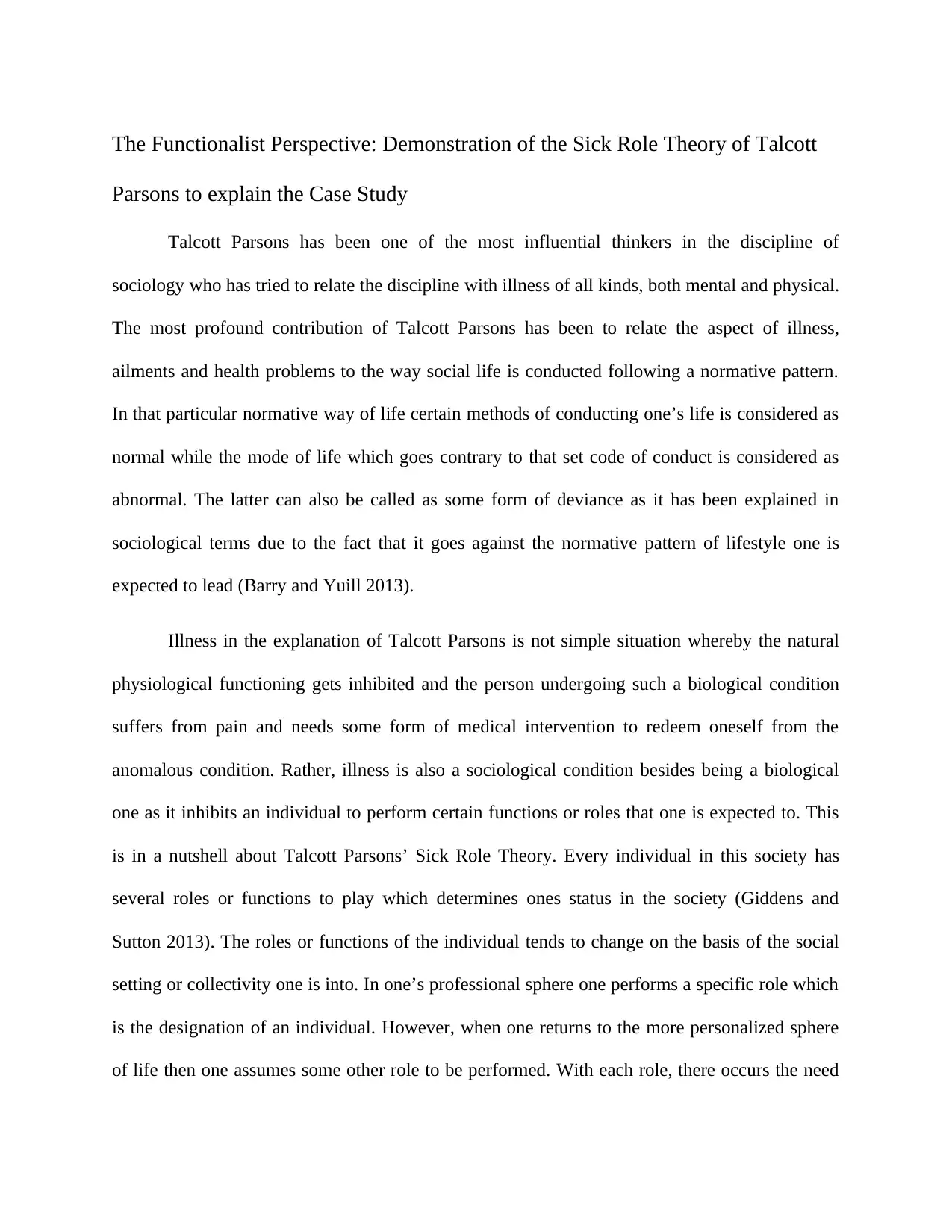
The Functionalist Perspective: Demonstration of the Sick Role Theory of Talcott
Parsons to explain the Case Study
Talcott Parsons has been one of the most influential thinkers in the discipline of
sociology who has tried to relate the discipline with illness of all kinds, both mental and physical.
The most profound contribution of Talcott Parsons has been to relate the aspect of illness,
ailments and health problems to the way social life is conducted following a normative pattern.
In that particular normative way of life certain methods of conducting one’s life is considered as
normal while the mode of life which goes contrary to that set code of conduct is considered as
abnormal. The latter can also be called as some form of deviance as it has been explained in
sociological terms due to the fact that it goes against the normative pattern of lifestyle one is
expected to lead (Barry and Yuill 2013).
Illness in the explanation of Talcott Parsons is not simple situation whereby the natural
physiological functioning gets inhibited and the person undergoing such a biological condition
suffers from pain and needs some form of medical intervention to redeem oneself from the
anomalous condition. Rather, illness is also a sociological condition besides being a biological
one as it inhibits an individual to perform certain functions or roles that one is expected to. This
is in a nutshell about Talcott Parsons’ Sick Role Theory. Every individual in this society has
several roles or functions to play which determines ones status in the society (Giddens and
Sutton 2013). The roles or functions of the individual tends to change on the basis of the social
setting or collectivity one is into. In one’s professional sphere one performs a specific role which
is the designation of an individual. However, when one returns to the more personalized sphere
of life then one assumes some other role to be performed. With each role, there occurs the need
Parsons to explain the Case Study
Talcott Parsons has been one of the most influential thinkers in the discipline of
sociology who has tried to relate the discipline with illness of all kinds, both mental and physical.
The most profound contribution of Talcott Parsons has been to relate the aspect of illness,
ailments and health problems to the way social life is conducted following a normative pattern.
In that particular normative way of life certain methods of conducting one’s life is considered as
normal while the mode of life which goes contrary to that set code of conduct is considered as
abnormal. The latter can also be called as some form of deviance as it has been explained in
sociological terms due to the fact that it goes against the normative pattern of lifestyle one is
expected to lead (Barry and Yuill 2013).
Illness in the explanation of Talcott Parsons is not simple situation whereby the natural
physiological functioning gets inhibited and the person undergoing such a biological condition
suffers from pain and needs some form of medical intervention to redeem oneself from the
anomalous condition. Rather, illness is also a sociological condition besides being a biological
one as it inhibits an individual to perform certain functions or roles that one is expected to. This
is in a nutshell about Talcott Parsons’ Sick Role Theory. Every individual in this society has
several roles or functions to play which determines ones status in the society (Giddens and
Sutton 2013). The roles or functions of the individual tends to change on the basis of the social
setting or collectivity one is into. In one’s professional sphere one performs a specific role which
is the designation of an individual. However, when one returns to the more personalized sphere
of life then one assumes some other role to be performed. With each role, there occurs the need
Secure Best Marks with AI Grader
Need help grading? Try our AI Grader for instant feedback on your assignments.
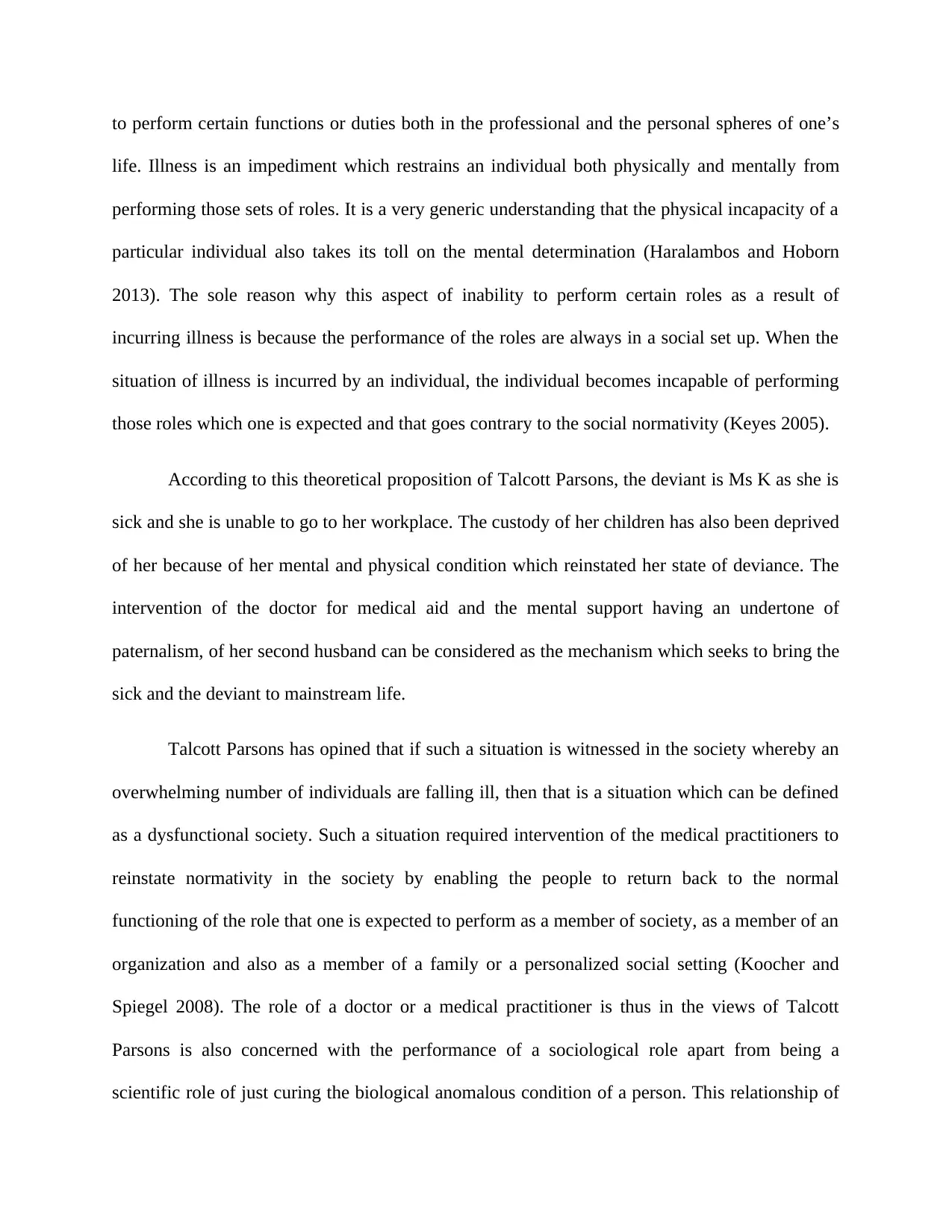
to perform certain functions or duties both in the professional and the personal spheres of one’s
life. Illness is an impediment which restrains an individual both physically and mentally from
performing those sets of roles. It is a very generic understanding that the physical incapacity of a
particular individual also takes its toll on the mental determination (Haralambos and Hoborn
2013). The sole reason why this aspect of inability to perform certain roles as a result of
incurring illness is because the performance of the roles are always in a social set up. When the
situation of illness is incurred by an individual, the individual becomes incapable of performing
those roles which one is expected and that goes contrary to the social normativity (Keyes 2005).
According to this theoretical proposition of Talcott Parsons, the deviant is Ms K as she is
sick and she is unable to go to her workplace. The custody of her children has also been deprived
of her because of her mental and physical condition which reinstated her state of deviance. The
intervention of the doctor for medical aid and the mental support having an undertone of
paternalism, of her second husband can be considered as the mechanism which seeks to bring the
sick and the deviant to mainstream life.
Talcott Parsons has opined that if such a situation is witnessed in the society whereby an
overwhelming number of individuals are falling ill, then that is a situation which can be defined
as a dysfunctional society. Such a situation required intervention of the medical practitioners to
reinstate normativity in the society by enabling the people to return back to the normal
functioning of the role that one is expected to perform as a member of society, as a member of an
organization and also as a member of a family or a personalized social setting (Koocher and
Spiegel 2008). The role of a doctor or a medical practitioner is thus in the views of Talcott
Parsons is also concerned with the performance of a sociological role apart from being a
scientific role of just curing the biological anomalous condition of a person. This relationship of
life. Illness is an impediment which restrains an individual both physically and mentally from
performing those sets of roles. It is a very generic understanding that the physical incapacity of a
particular individual also takes its toll on the mental determination (Haralambos and Hoborn
2013). The sole reason why this aspect of inability to perform certain roles as a result of
incurring illness is because the performance of the roles are always in a social set up. When the
situation of illness is incurred by an individual, the individual becomes incapable of performing
those roles which one is expected and that goes contrary to the social normativity (Keyes 2005).
According to this theoretical proposition of Talcott Parsons, the deviant is Ms K as she is
sick and she is unable to go to her workplace. The custody of her children has also been deprived
of her because of her mental and physical condition which reinstated her state of deviance. The
intervention of the doctor for medical aid and the mental support having an undertone of
paternalism, of her second husband can be considered as the mechanism which seeks to bring the
sick and the deviant to mainstream life.
Talcott Parsons has opined that if such a situation is witnessed in the society whereby an
overwhelming number of individuals are falling ill, then that is a situation which can be defined
as a dysfunctional society. Such a situation required intervention of the medical practitioners to
reinstate normativity in the society by enabling the people to return back to the normal
functioning of the role that one is expected to perform as a member of society, as a member of an
organization and also as a member of a family or a personalized social setting (Koocher and
Spiegel 2008). The role of a doctor or a medical practitioner is thus in the views of Talcott
Parsons is also concerned with the performance of a sociological role apart from being a
scientific role of just curing the biological anomalous condition of a person. This relationship of
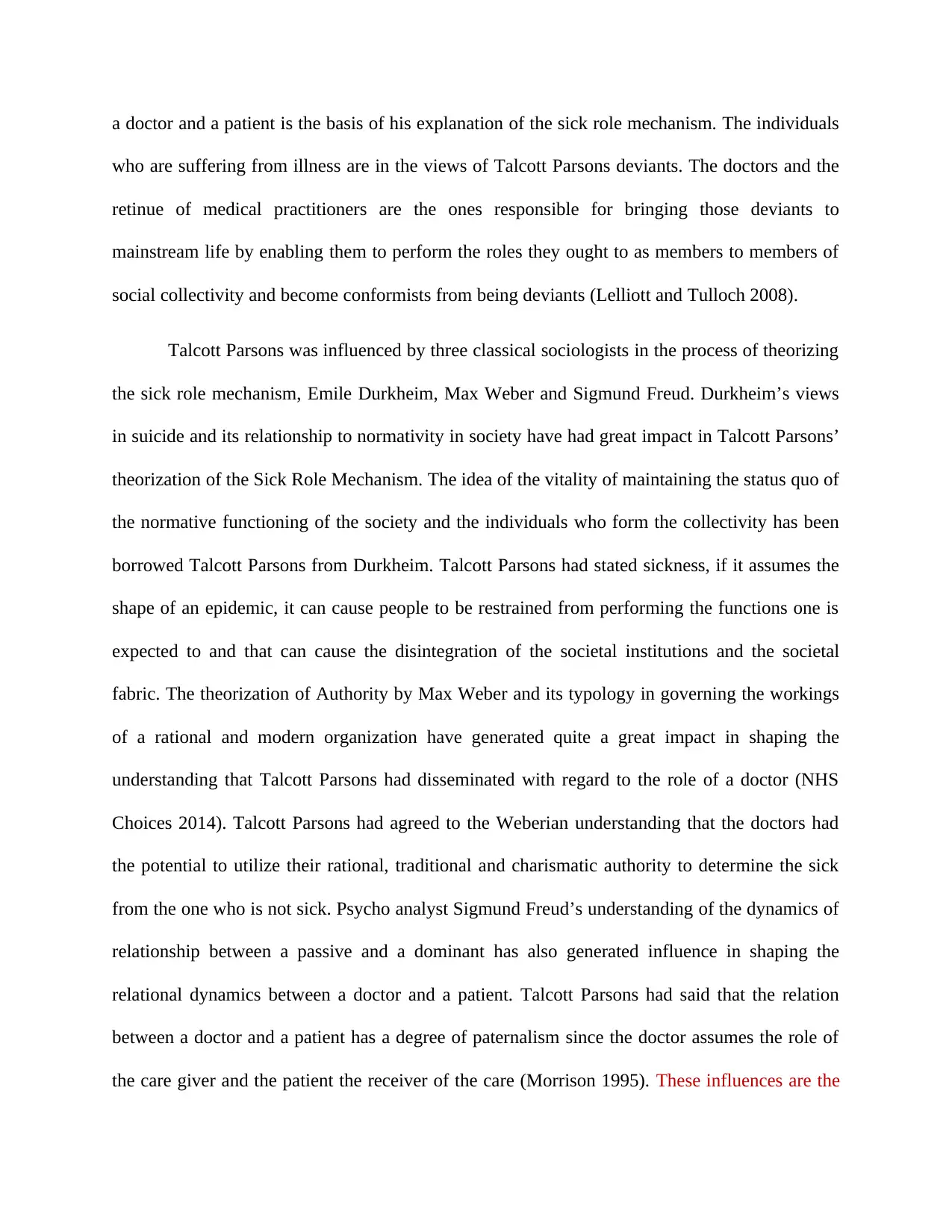
a doctor and a patient is the basis of his explanation of the sick role mechanism. The individuals
who are suffering from illness are in the views of Talcott Parsons deviants. The doctors and the
retinue of medical practitioners are the ones responsible for bringing those deviants to
mainstream life by enabling them to perform the roles they ought to as members to members of
social collectivity and become conformists from being deviants (Lelliott and Tulloch 2008).
Talcott Parsons was influenced by three classical sociologists in the process of theorizing
the sick role mechanism, Emile Durkheim, Max Weber and Sigmund Freud. Durkheim’s views
in suicide and its relationship to normativity in society have had great impact in Talcott Parsons’
theorization of the Sick Role Mechanism. The idea of the vitality of maintaining the status quo of
the normative functioning of the society and the individuals who form the collectivity has been
borrowed Talcott Parsons from Durkheim. Talcott Parsons had stated sickness, if it assumes the
shape of an epidemic, it can cause people to be restrained from performing the functions one is
expected to and that can cause the disintegration of the societal institutions and the societal
fabric. The theorization of Authority by Max Weber and its typology in governing the workings
of a rational and modern organization have generated quite a great impact in shaping the
understanding that Talcott Parsons had disseminated with regard to the role of a doctor (NHS
Choices 2014). Talcott Parsons had agreed to the Weberian understanding that the doctors had
the potential to utilize their rational, traditional and charismatic authority to determine the sick
from the one who is not sick. Psycho analyst Sigmund Freud’s understanding of the dynamics of
relationship between a passive and a dominant has also generated influence in shaping the
relational dynamics between a doctor and a patient. Talcott Parsons had said that the relation
between a doctor and a patient has a degree of paternalism since the doctor assumes the role of
the care giver and the patient the receiver of the care (Morrison 1995). These influences are the
who are suffering from illness are in the views of Talcott Parsons deviants. The doctors and the
retinue of medical practitioners are the ones responsible for bringing those deviants to
mainstream life by enabling them to perform the roles they ought to as members to members of
social collectivity and become conformists from being deviants (Lelliott and Tulloch 2008).
Talcott Parsons was influenced by three classical sociologists in the process of theorizing
the sick role mechanism, Emile Durkheim, Max Weber and Sigmund Freud. Durkheim’s views
in suicide and its relationship to normativity in society have had great impact in Talcott Parsons’
theorization of the Sick Role Mechanism. The idea of the vitality of maintaining the status quo of
the normative functioning of the society and the individuals who form the collectivity has been
borrowed Talcott Parsons from Durkheim. Talcott Parsons had stated sickness, if it assumes the
shape of an epidemic, it can cause people to be restrained from performing the functions one is
expected to and that can cause the disintegration of the societal institutions and the societal
fabric. The theorization of Authority by Max Weber and its typology in governing the workings
of a rational and modern organization have generated quite a great impact in shaping the
understanding that Talcott Parsons had disseminated with regard to the role of a doctor (NHS
Choices 2014). Talcott Parsons had agreed to the Weberian understanding that the doctors had
the potential to utilize their rational, traditional and charismatic authority to determine the sick
from the one who is not sick. Psycho analyst Sigmund Freud’s understanding of the dynamics of
relationship between a passive and a dominant has also generated influence in shaping the
relational dynamics between a doctor and a patient. Talcott Parsons had said that the relation
between a doctor and a patient has a degree of paternalism since the doctor assumes the role of
the care giver and the patient the receiver of the care (Morrison 1995). These influences are the
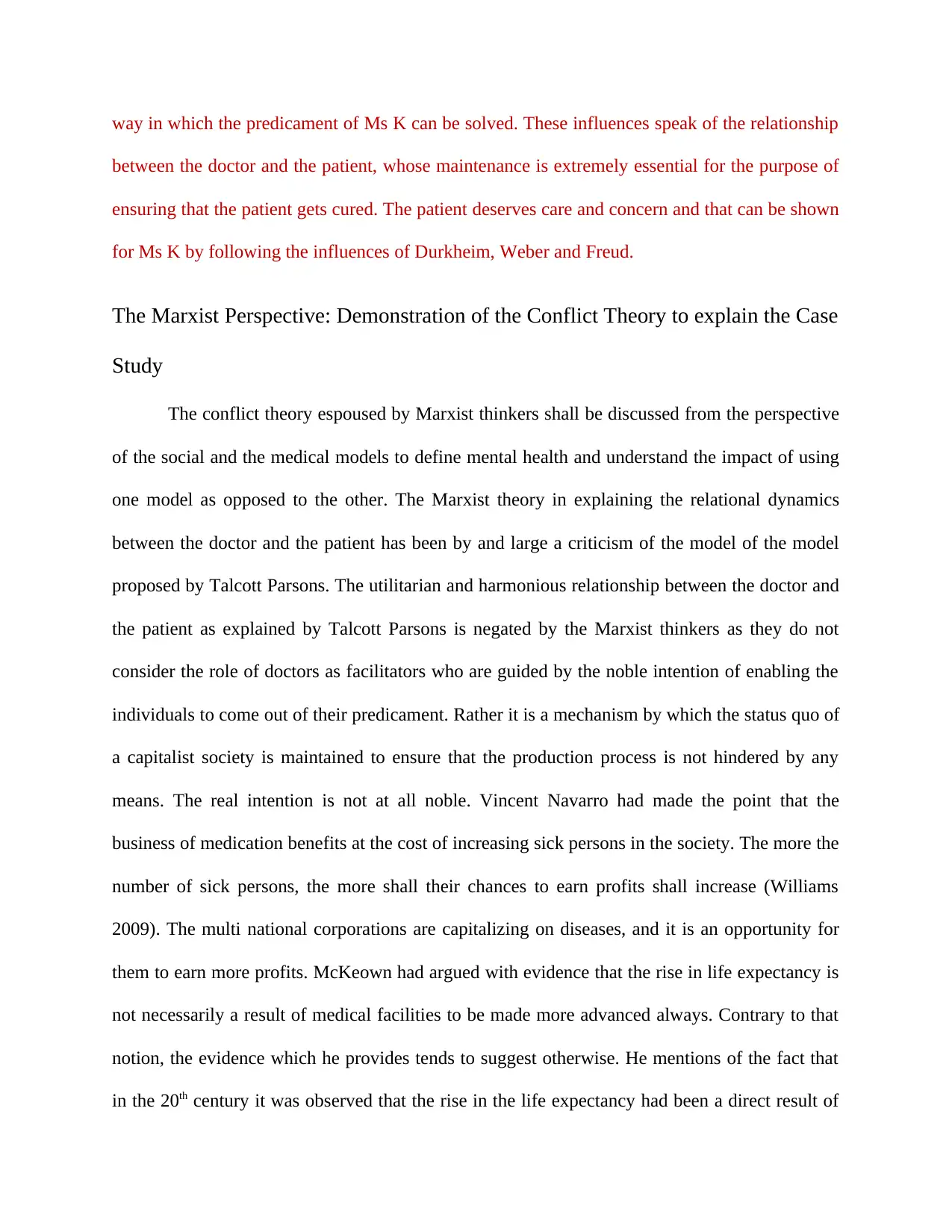
way in which the predicament of Ms K can be solved. These influences speak of the relationship
between the doctor and the patient, whose maintenance is extremely essential for the purpose of
ensuring that the patient gets cured. The patient deserves care and concern and that can be shown
for Ms K by following the influences of Durkheim, Weber and Freud.
The Marxist Perspective: Demonstration of the Conflict Theory to explain the Case
Study
The conflict theory espoused by Marxist thinkers shall be discussed from the perspective
of the social and the medical models to define mental health and understand the impact of using
one model as opposed to the other. The Marxist theory in explaining the relational dynamics
between the doctor and the patient has been by and large a criticism of the model of the model
proposed by Talcott Parsons. The utilitarian and harmonious relationship between the doctor and
the patient as explained by Talcott Parsons is negated by the Marxist thinkers as they do not
consider the role of doctors as facilitators who are guided by the noble intention of enabling the
individuals to come out of their predicament. Rather it is a mechanism by which the status quo of
a capitalist society is maintained to ensure that the production process is not hindered by any
means. The real intention is not at all noble. Vincent Navarro had made the point that the
business of medication benefits at the cost of increasing sick persons in the society. The more the
number of sick persons, the more shall their chances to earn profits shall increase (Williams
2009). The multi national corporations are capitalizing on diseases, and it is an opportunity for
them to earn more profits. McKeown had argued with evidence that the rise in life expectancy is
not necessarily a result of medical facilities to be made more advanced always. Contrary to that
notion, the evidence which he provides tends to suggest otherwise. He mentions of the fact that
in the 20th century it was observed that the rise in the life expectancy had been a direct result of
between the doctor and the patient, whose maintenance is extremely essential for the purpose of
ensuring that the patient gets cured. The patient deserves care and concern and that can be shown
for Ms K by following the influences of Durkheim, Weber and Freud.
The Marxist Perspective: Demonstration of the Conflict Theory to explain the Case
Study
The conflict theory espoused by Marxist thinkers shall be discussed from the perspective
of the social and the medical models to define mental health and understand the impact of using
one model as opposed to the other. The Marxist theory in explaining the relational dynamics
between the doctor and the patient has been by and large a criticism of the model of the model
proposed by Talcott Parsons. The utilitarian and harmonious relationship between the doctor and
the patient as explained by Talcott Parsons is negated by the Marxist thinkers as they do not
consider the role of doctors as facilitators who are guided by the noble intention of enabling the
individuals to come out of their predicament. Rather it is a mechanism by which the status quo of
a capitalist society is maintained to ensure that the production process is not hindered by any
means. The real intention is not at all noble. Vincent Navarro had made the point that the
business of medication benefits at the cost of increasing sick persons in the society. The more the
number of sick persons, the more shall their chances to earn profits shall increase (Williams
2009). The multi national corporations are capitalizing on diseases, and it is an opportunity for
them to earn more profits. McKeown had argued with evidence that the rise in life expectancy is
not necessarily a result of medical facilities to be made more advanced always. Contrary to that
notion, the evidence which he provides tends to suggest otherwise. He mentions of the fact that
in the 20th century it was observed that the rise in the life expectancy had been a direct result of
Secure Best Marks with AI Grader
Need help grading? Try our AI Grader for instant feedback on your assignments.
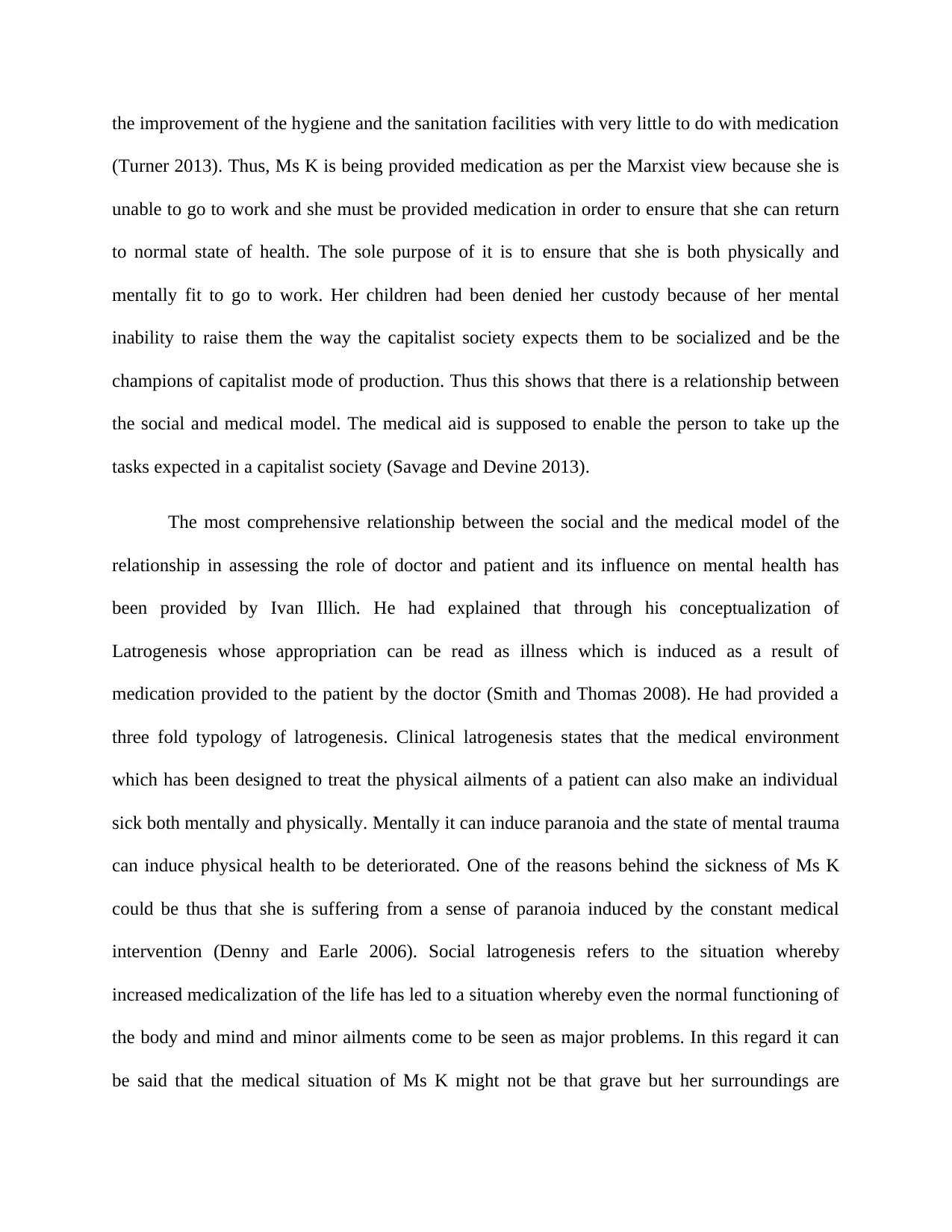
the improvement of the hygiene and the sanitation facilities with very little to do with medication
(Turner 2013). Thus, Ms K is being provided medication as per the Marxist view because she is
unable to go to work and she must be provided medication in order to ensure that she can return
to normal state of health. The sole purpose of it is to ensure that she is both physically and
mentally fit to go to work. Her children had been denied her custody because of her mental
inability to raise them the way the capitalist society expects them to be socialized and be the
champions of capitalist mode of production. Thus this shows that there is a relationship between
the social and medical model. The medical aid is supposed to enable the person to take up the
tasks expected in a capitalist society (Savage and Devine 2013).
The most comprehensive relationship between the social and the medical model of the
relationship in assessing the role of doctor and patient and its influence on mental health has
been provided by Ivan Illich. He had explained that through his conceptualization of
Latrogenesis whose appropriation can be read as illness which is induced as a result of
medication provided to the patient by the doctor (Smith and Thomas 2008). He had provided a
three fold typology of latrogenesis. Clinical latrogenesis states that the medical environment
which has been designed to treat the physical ailments of a patient can also make an individual
sick both mentally and physically. Mentally it can induce paranoia and the state of mental trauma
can induce physical health to be deteriorated. One of the reasons behind the sickness of Ms K
could be thus that she is suffering from a sense of paranoia induced by the constant medical
intervention (Denny and Earle 2006). Social latrogenesis refers to the situation whereby
increased medicalization of the life has led to a situation whereby even the normal functioning of
the body and mind and minor ailments come to be seen as major problems. In this regard it can
be said that the medical situation of Ms K might not be that grave but her surroundings are
(Turner 2013). Thus, Ms K is being provided medication as per the Marxist view because she is
unable to go to work and she must be provided medication in order to ensure that she can return
to normal state of health. The sole purpose of it is to ensure that she is both physically and
mentally fit to go to work. Her children had been denied her custody because of her mental
inability to raise them the way the capitalist society expects them to be socialized and be the
champions of capitalist mode of production. Thus this shows that there is a relationship between
the social and medical model. The medical aid is supposed to enable the person to take up the
tasks expected in a capitalist society (Savage and Devine 2013).
The most comprehensive relationship between the social and the medical model of the
relationship in assessing the role of doctor and patient and its influence on mental health has
been provided by Ivan Illich. He had explained that through his conceptualization of
Latrogenesis whose appropriation can be read as illness which is induced as a result of
medication provided to the patient by the doctor (Smith and Thomas 2008). He had provided a
three fold typology of latrogenesis. Clinical latrogenesis states that the medical environment
which has been designed to treat the physical ailments of a patient can also make an individual
sick both mentally and physically. Mentally it can induce paranoia and the state of mental trauma
can induce physical health to be deteriorated. One of the reasons behind the sickness of Ms K
could be thus that she is suffering from a sense of paranoia induced by the constant medical
intervention (Denny and Earle 2006). Social latrogenesis refers to the situation whereby
increased medicalization of the life has led to a situation whereby even the normal functioning of
the body and mind and minor ailments come to be seen as major problems. In this regard it can
be said that the medical situation of Ms K might not be that grave but her surroundings are
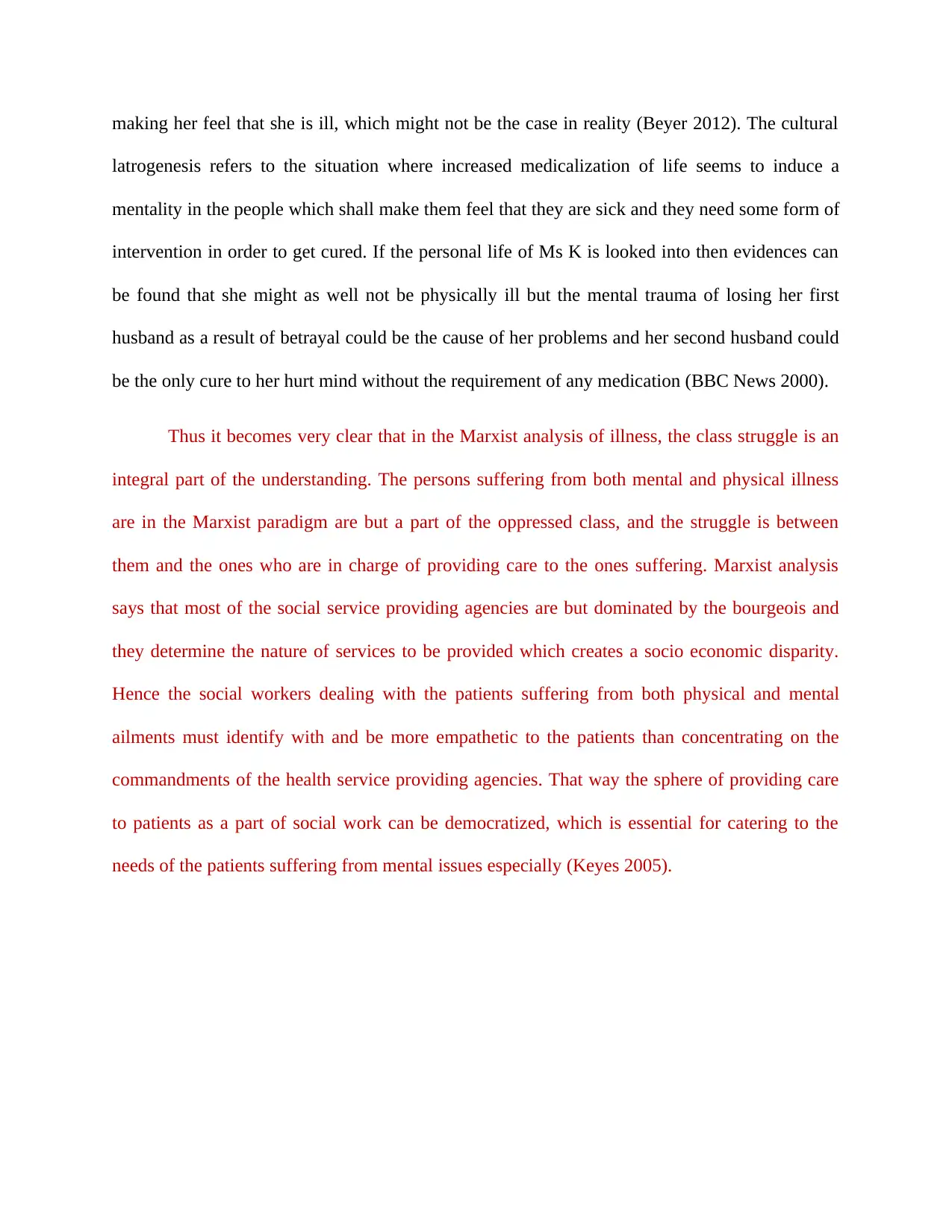
making her feel that she is ill, which might not be the case in reality (Beyer 2012). The cultural
latrogenesis refers to the situation where increased medicalization of life seems to induce a
mentality in the people which shall make them feel that they are sick and they need some form of
intervention in order to get cured. If the personal life of Ms K is looked into then evidences can
be found that she might as well not be physically ill but the mental trauma of losing her first
husband as a result of betrayal could be the cause of her problems and her second husband could
be the only cure to her hurt mind without the requirement of any medication (BBC News 2000).
Thus it becomes very clear that in the Marxist analysis of illness, the class struggle is an
integral part of the understanding. The persons suffering from both mental and physical illness
are in the Marxist paradigm are but a part of the oppressed class, and the struggle is between
them and the ones who are in charge of providing care to the ones suffering. Marxist analysis
says that most of the social service providing agencies are but dominated by the bourgeois and
they determine the nature of services to be provided which creates a socio economic disparity.
Hence the social workers dealing with the patients suffering from both physical and mental
ailments must identify with and be more empathetic to the patients than concentrating on the
commandments of the health service providing agencies. That way the sphere of providing care
to patients as a part of social work can be democratized, which is essential for catering to the
needs of the patients suffering from mental issues especially (Keyes 2005).
latrogenesis refers to the situation where increased medicalization of life seems to induce a
mentality in the people which shall make them feel that they are sick and they need some form of
intervention in order to get cured. If the personal life of Ms K is looked into then evidences can
be found that she might as well not be physically ill but the mental trauma of losing her first
husband as a result of betrayal could be the cause of her problems and her second husband could
be the only cure to her hurt mind without the requirement of any medication (BBC News 2000).
Thus it becomes very clear that in the Marxist analysis of illness, the class struggle is an
integral part of the understanding. The persons suffering from both mental and physical illness
are in the Marxist paradigm are but a part of the oppressed class, and the struggle is between
them and the ones who are in charge of providing care to the ones suffering. Marxist analysis
says that most of the social service providing agencies are but dominated by the bourgeois and
they determine the nature of services to be provided which creates a socio economic disparity.
Hence the social workers dealing with the patients suffering from both physical and mental
ailments must identify with and be more empathetic to the patients than concentrating on the
commandments of the health service providing agencies. That way the sphere of providing care
to patients as a part of social work can be democratized, which is essential for catering to the
needs of the patients suffering from mental issues especially (Keyes 2005).
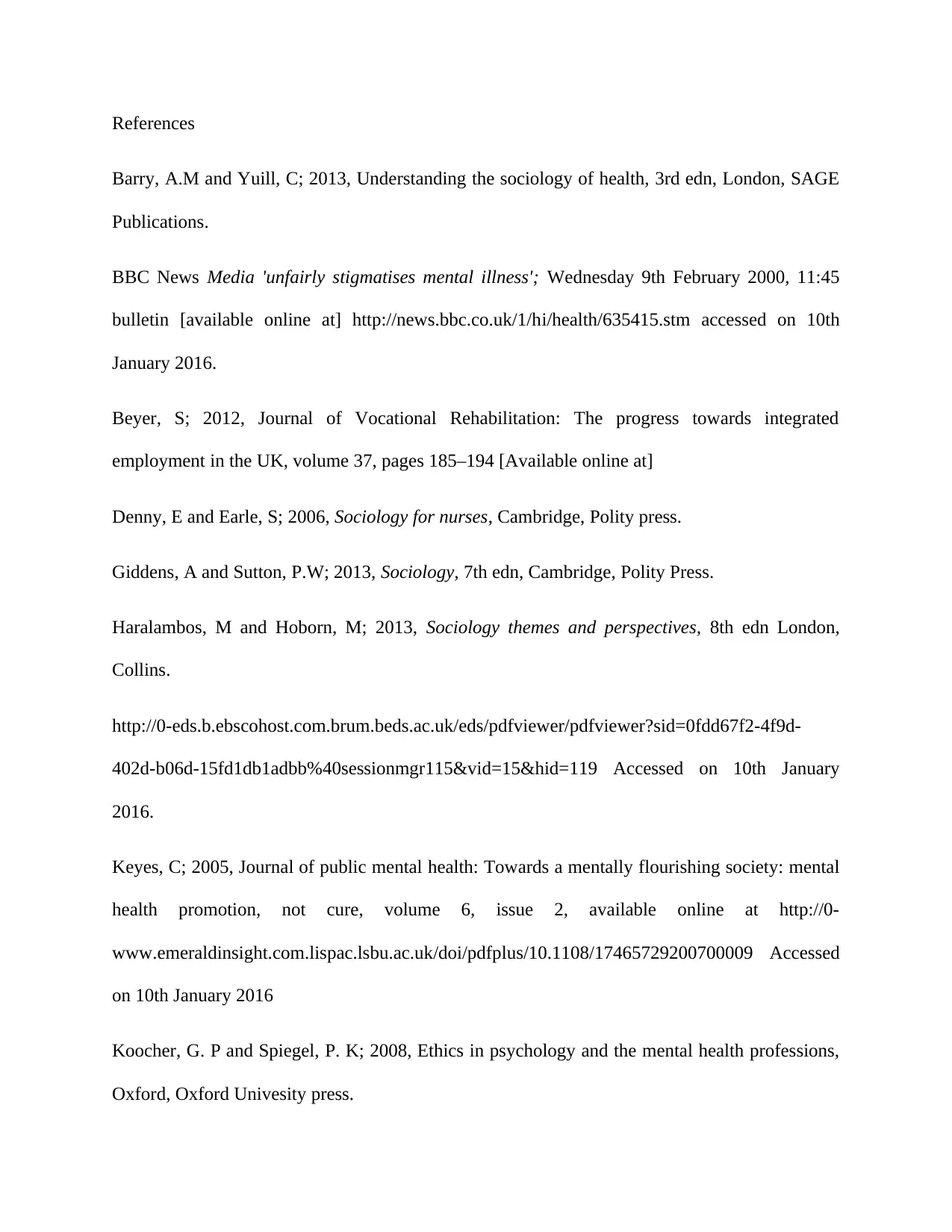
References
Barry, A.M and Yuill, C; 2013, Understanding the sociology of health, 3rd edn, London, SAGE
Publications.
BBC News Media 'unfairly stigmatises mental illness'; Wednesday 9th February 2000, 11:45
bulletin [available online at] http://news.bbc.co.uk/1/hi/health/635415.stm accessed on 10th
January 2016.
Beyer, S; 2012, Journal of Vocational Rehabilitation: The progress towards integrated
employment in the UK, volume 37, pages 185–194 [Available online at]
Denny, E and Earle, S; 2006, Sociology for nurses, Cambridge, Polity press.
Giddens, A and Sutton, P.W; 2013, Sociology, 7th edn, Cambridge, Polity Press.
Haralambos, M and Hoborn, M; 2013, Sociology themes and perspectives, 8th edn London,
Collins.
http://0-eds.b.ebscohost.com.brum.beds.ac.uk/eds/pdfviewer/pdfviewer?sid=0fdd67f2-4f9d-
402d-b06d-15fd1db1adbb%40sessionmgr115&vid=15&hid=119 Accessed on 10th January
2016.
Keyes, C; 2005, Journal of public mental health: Towards a mentally flourishing society: mental
health promotion, not cure, volume 6, issue 2, available online at http://0-
www.emeraldinsight.com.lispac.lsbu.ac.uk/doi/pdfplus/10.1108/17465729200700009 Accessed
on 10th January 2016
Koocher, G. P and Spiegel, P. K; 2008, Ethics in psychology and the mental health professions,
Oxford, Oxford Univesity press.
Barry, A.M and Yuill, C; 2013, Understanding the sociology of health, 3rd edn, London, SAGE
Publications.
BBC News Media 'unfairly stigmatises mental illness'; Wednesday 9th February 2000, 11:45
bulletin [available online at] http://news.bbc.co.uk/1/hi/health/635415.stm accessed on 10th
January 2016.
Beyer, S; 2012, Journal of Vocational Rehabilitation: The progress towards integrated
employment in the UK, volume 37, pages 185–194 [Available online at]
Denny, E and Earle, S; 2006, Sociology for nurses, Cambridge, Polity press.
Giddens, A and Sutton, P.W; 2013, Sociology, 7th edn, Cambridge, Polity Press.
Haralambos, M and Hoborn, M; 2013, Sociology themes and perspectives, 8th edn London,
Collins.
http://0-eds.b.ebscohost.com.brum.beds.ac.uk/eds/pdfviewer/pdfviewer?sid=0fdd67f2-4f9d-
402d-b06d-15fd1db1adbb%40sessionmgr115&vid=15&hid=119 Accessed on 10th January
2016.
Keyes, C; 2005, Journal of public mental health: Towards a mentally flourishing society: mental
health promotion, not cure, volume 6, issue 2, available online at http://0-
www.emeraldinsight.com.lispac.lsbu.ac.uk/doi/pdfplus/10.1108/17465729200700009 Accessed
on 10th January 2016
Koocher, G. P and Spiegel, P. K; 2008, Ethics in psychology and the mental health professions,
Oxford, Oxford Univesity press.
Paraphrase This Document
Need a fresh take? Get an instant paraphrase of this document with our AI Paraphraser
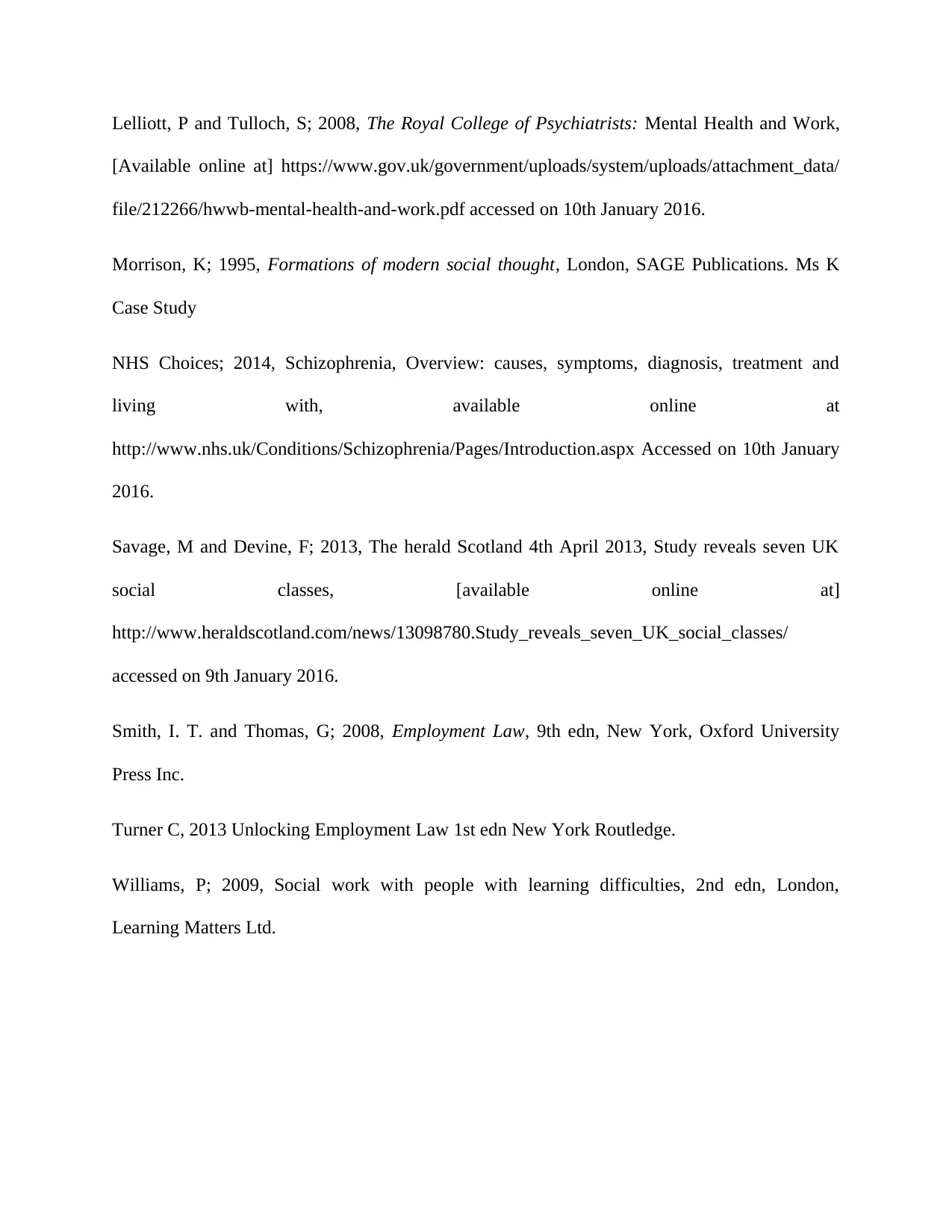
Lelliott, P and Tulloch, S; 2008, The Royal College of Psychiatrists: Mental Health and Work,
[Available online at] https://www.gov.uk/government/uploads/system/uploads/attachment_data/
file/212266/hwwb-mental-health-and-work.pdf accessed on 10th January 2016.
Morrison, K; 1995, Formations of modern social thought, London, SAGE Publications. Ms K
Case Study
NHS Choices; 2014, Schizophrenia, Overview: causes, symptoms, diagnosis, treatment and
living with, available online at
http://www.nhs.uk/Conditions/Schizophrenia/Pages/Introduction.aspx Accessed on 10th January
2016.
Savage, M and Devine, F; 2013, The herald Scotland 4th April 2013, Study reveals seven UK
social classes, [available online at]
http://www.heraldscotland.com/news/13098780.Study_reveals_seven_UK_social_classes/
accessed on 9th January 2016.
Smith, I. T. and Thomas, G; 2008, Employment Law, 9th edn, New York, Oxford University
Press Inc.
Turner C, 2013 Unlocking Employment Law 1st edn New York Routledge.
Williams, P; 2009, Social work with people with learning difficulties, 2nd edn, London,
Learning Matters Ltd.
[Available online at] https://www.gov.uk/government/uploads/system/uploads/attachment_data/
file/212266/hwwb-mental-health-and-work.pdf accessed on 10th January 2016.
Morrison, K; 1995, Formations of modern social thought, London, SAGE Publications. Ms K
Case Study
NHS Choices; 2014, Schizophrenia, Overview: causes, symptoms, diagnosis, treatment and
living with, available online at
http://www.nhs.uk/Conditions/Schizophrenia/Pages/Introduction.aspx Accessed on 10th January
2016.
Savage, M and Devine, F; 2013, The herald Scotland 4th April 2013, Study reveals seven UK
social classes, [available online at]
http://www.heraldscotland.com/news/13098780.Study_reveals_seven_UK_social_classes/
accessed on 9th January 2016.
Smith, I. T. and Thomas, G; 2008, Employment Law, 9th edn, New York, Oxford University
Press Inc.
Turner C, 2013 Unlocking Employment Law 1st edn New York Routledge.
Williams, P; 2009, Social work with people with learning difficulties, 2nd edn, London,
Learning Matters Ltd.
1 out of 8
Related Documents
Your All-in-One AI-Powered Toolkit for Academic Success.
+13062052269
info@desklib.com
Available 24*7 on WhatsApp / Email
![[object Object]](/_next/static/media/star-bottom.7253800d.svg)
Unlock your academic potential
© 2024 | Zucol Services PVT LTD | All rights reserved.





